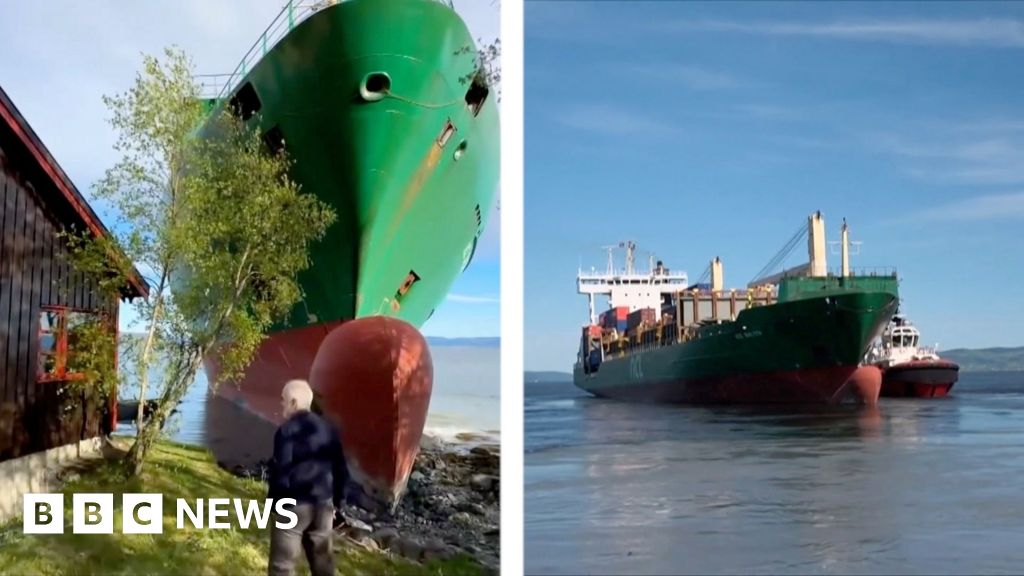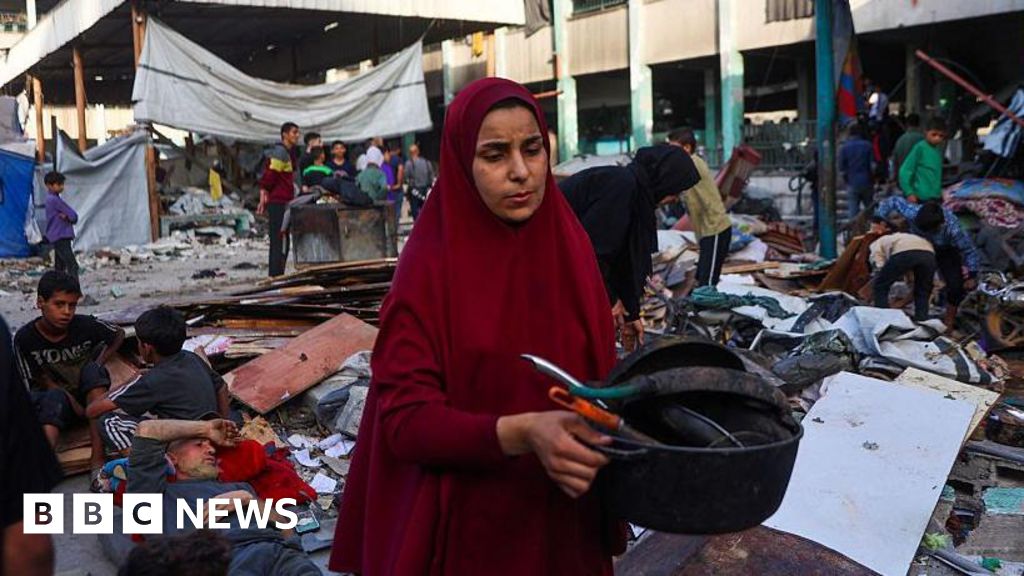ARTICLE AD BOX
By Caroline Davies
BBC News, Odesa
Image source, Konstantin.S
Image caption,Russian military vehicles on the streets of Kherson.
The Russian rouble will be used in Kherson from Sunday, according to Russia-backed forces that have taken control of the southern Ukrainian city.
However, Kherson's Ukrainian mayor, Ihor Kolykhaiev, who has now been overthrown by Russian authorities, has said that he doesn't believe this will be possible while the only working banking system in the region is Ukrainian, not Russian.
Despite being occupied for 60 days, many residents are trying to find small ways to defy the Russian forces - like exchanging any roubles they receive back into Ukraine's currency, the hryvnia.
But there are very few ways to safely snub the Russian army when it occupies your streets.
Z signs - a Russian pro-war symbol - have appeared around the city. Russian flags hang above Kherson's government buildings. Ukrainian TV has been mostly cut off, changed to Russian news. Russian soldiers drive armoured vehicles through the city centre, between a network of check points.
Now, changing the region's currency is yet another bid to erase Ukrainian identity from the city.
"I think most people will leave here if the rouble is introduced," Olga, who didn't want to use her real name, told me from inside Kherson.
"At the moment there are still currency exchanges operating in the city. If I am paid in roubles, I think I will just go and exchange it for hryvnia, I think others will too. It's just a small act of protest."
Olga is not the only one with this plan. Ukrainian news reports have said that some pensions have been handed out in roubles around Kherson, but that people have already exchanged it back into Ukrainian hryvnia.
Life in Kherson has become increasingly difficult. Many now feel nervous about even speaking to a journalist. When we reach Olga and ask how she is feeling, she sighs.
"I'm alive and I have food," she says.
Around 40% of the population have fled in the two months since this key, strategic city was taken by Russia, according to the mayor.
Many residents tell us about their struggle to pay for what few goods there are, as supermarket shelves lie empty. They say that shops, restaurants and businesses have closed and parts of the economy have ground to a halt, cut off from much of the world.
Earlier this week, Russian forces appointed a new administration in Kherson because Mr Kolykhaiev was "not cooperating" with the occupied forces, according to Russian state news agency Ria.
The Ukrainian mayor of Kherson, Ihor Kolykhaiev, has now been replaced with a Russian administration
Speaking on video call from somewhere in the region, with piles of binders and a toy camouflage jeep sitting on shelves behind him, Mr Kolykhaiev says he has not stopped working. He is sceptical of whether Russia can successfully introduce the rouble.
"I have no confirmation that it's been introduced," he says. "When can it appear? When the treasury and the banking system of Ukraine will stop working? Anything can happen under occupation, I can't get into Russia's head to find out what they are thinking. If they do try to introduce the rouble zone here, we would be plunged back into 1992 - before Ukraine gained its independence."
Ukrainian authorities had suggested that Russia could try to hold a referendum in the region on 1 May, asking voters whether they want independence from Ukraine. Any attempt to do this would be seen as a way to legitimise Russia's intervention, suggesting that residents no longer want to be part of Ukraine and painting Russia as liberators.
Russia held a referendum in Crimea after Moscow annexed it in 2014, and also in the Russian-backed separatist areas of Donetsk and Luhansk. Russia has denied plans to hold a vote in Kherson, and for now residents in the city say they've seen no sign of it.
Rumours swirl on social media channels about what could happen. Some Ukrainians are worried that Russia will simply fake the result and use records of their identity documents - which they fear the Russians could gain access to in the administrative buildings they now occupy - to back it up.
"I'm not sure they even need the population here to know that there is a referendum," says Olga. "I guess they can do it without us. Maybe I already voted."
Routes to safety shut off
Several people inside Kherson told us that the routes out to safer parts of Ukraine have now been shut altogether. The only road available is through Crimea which means travelling into Russian territory, something several Ukrainians told us they would not be prepared to do.
Maxim felt this was his only route to safety. He didn't want his name to be used as his family are still inside the city. At the border he was subject to a long interrogation as a security guard inspected his body for tattoos.
"It was like a film," he said. "You sit on a suitcase under the scorching sun to be interrogated. I would never have imagined I would have to go through this. I was really horrified, because it's scary - people with machine guns are walking past you."
His favourite artist almost got him into difficulties.
"They were asking me the same questions on repeat," he says. "I have a David Bowie lightning tattoo and they asked me 'Is that Azov?'" The Azov battalion are a controversial regiment that was originally a far-right group later incorporated into Ukraine's National Guard.
Many supermarket shelves in Kherson are empty
Maxim says that many of the cars in the queue had Kherson number plates. He has since safely travelled through Georgia and on to Europe.
"Reaching Georgia was like being released from jail," he says. "You feel like you've got your human rights back."
For those still in Kherson there are deep fears about the future.
"I am afraid of a humanitarian catastrophe," says Mr Kolykhaiev. "I am worried for the people who are still in the city today. They are all hostages.
"It's like we started with 100 litres of petrol in the car tank and we are driving until the gas runs out. I want to calculate how long we can keep driving. How long can we carry the city?"

 3 years ago
34
3 years ago
34








 English (US) ·
English (US) ·